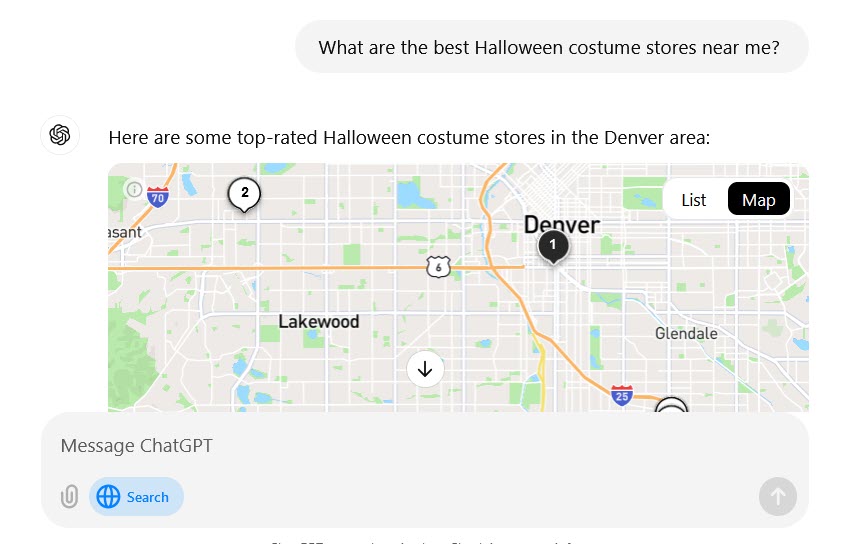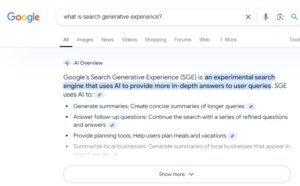With the rise of generative AI and real-time data integration, tools like ChatGPT with Search and SearchGPT are changing how businesses approach SEO, particularly for local search. Both offer advanced search functionalities, but understanding their unique characteristics is essential for local businesses to optimize their online presence effectively. Here’s a detailed comparison between ChatGPT with Search and SearchGPT, along with actionable strategies for local SEO.
ChatGPT with Search vs. SearchGPT: Key Differences
ChatGPT with Search:
- Definition: ChatGPT with Search is a version of the general-purpose ChatGPT model that can access and pull data from the web in real time using Bing-powered search capabilities. This integration allows it to provide up-to-date, contextual information in response to user queries, making it highly effective for addressing current events, local searches, and specific user needs.
- Primary Use: Combines generative AI with real-time web data to provide more relevant and timely responses. While it maintains the conversational, assistance-focused nature of ChatGPT, it also acts as an up-to-date information source for users.
SearchGPT:
- Definition: SearchGPT is designed with search-specific optimizations, combining traditional search engine functionalities with the capabilities of generative AI. It is geared toward refining and contextualizing search results to offer personalized, real-time, and highly targeted answers.
- Primary Use: Focuses on providing in-depth, search-driven answers, making it particularly powerful for multi-step searches and nuanced local queries.
1. Enhanced Personalization and Contextual Relevance
ChatGPT with Search and SearchGPT both offer highly personalized results that are context-aware. This includes considering user preferences, location, and even the time of day to tailor responses more accurately.
Optimization Strategy: Businesses should include localized keywords and content that considers common user questions and preferences. Utilize tools like AnswerThePublic to find relevant, location-based queries and update your content regularly to reflect real-time interests.
Example: If a user searches for “best Mexican restaurants in Boulder open tonight,” ChatGPT with Search can pull current opening hours and recent reviews, while SearchGPT can refine this further based on user history or preferences.
2. Supporting Multi-Step, Conversational Search
Both ChatGPT with Search and SearchGPT excel in handling multi-step, conversational queries, making it easier for users to build upon their initial searches with follow-up questions. This requires businesses to optimize their content to accommodate natural language and related queries.
Optimization Strategy: Structure your content to support semantic search by including question-based headers and content that anticipates follow-up queries. Use long-tail keywords and ensure that pages are optimized to answer nuanced, specific questions.
Example: If a user starts with “best family-friendly attractions in Denver” and follows with “Which of these are free?”, both tools can provide accurate, layered responses if the content is optimized correctly.
3. Adapting SEO Strategies for Real-Time Search
SearchGPT offers an edge by delivering search results with real-time relevance, pulling data on recent developments, events, and business updates. ChatGPT with Search also provides current results but maintains a broader, conversational approach.
Optimization Strategy: Ensure that your website is updated frequently and reflects any changes in hours, services, or promotions. Use real-time monitoring tools like Google Alerts or Ahrefs Alerts to track industry trends and feedback.
Example: Event venues or restaurants should list up-to-date event calendars and current promotions on their site and social media.
4. Optimizing for Voice Search and Conversational Queries
With both tools supporting longer, conversational queries, businesses must adapt content for voice search optimization. These queries often reflect a more natural language style, making them more specific and complex than traditional text searches.
Optimization Strategy: Develop an FAQ page that answers full, conversational questions as users would ask them aloud. Integrate question-based headers and answers that mimic spoken language.
Example: Voice queries like “Where’s the nearest pharmacy open 24 hours in Boulder?” or “Best vegan breakfast options in Denver?” should be reflected in your website content.
5. Leveraging Rich Snippets and Structured Data for Better Visibility
SearchGPT and ChatGPT with Search frequently display results as featured snippets directly in search engine results pages (SERPs). Businesses should include structured data to increase the likelihood of appearing in these rich results.
Optimization Strategy: Implement schema markup for business details, products, reviews, and services. Use tools such as Schema Markup Generator to ensure your site is configured properly.
Example: Structured data for local businesses can include attributes like business type, hours of operation, menu items, and reviews to ensure comprehensive SERP displays.
6. High-Quality, Engaging Content for Local Authority
SearchGPT excels at pulling in-depth, search-driven content, while ChatGPT with Search supports a broader, conversational approach to content discovery. To compete, businesses should create high-quality content that establishes local authority.
Optimization Strategy: Focus on creating locally relevant content that answers user questions, highlights expertise, and engages readers. Include guides, blog posts, and multimedia content such as videos and infographics.
Example: Articles titled “Top Five Hiking Spots Near Boulder with Stunning Views” or “Best Family-Friendly Parks in Denver” that include location-specific tips, photos, and user-generated content can drive traffic and establish credibility.
7. Keeping Local Listings Accurate and Up-to-Date
Ensuring that your Google Business Profile and other local listings are current is critical for appearing in searches by ChatGPT with Search and SearchGPT. Consistency in your business’s name, address, phone number (NAP), and other details helps build trust and credibility.
Optimization Strategy: Regularly verify and update your business information to keep listings consistent across platforms.
Example: Encourage customers to leave positive reviews and respond to them to boost engagement and trustworthiness.
8. Using Social Media and Real-Time Updates
Both ChatGPT with Search and SearchGPT can pull data from social media and live updates, making it vital for businesses to maintain active, current social profiles.
Optimization Strategy: Use social media platforms and tools to manage regular posts, highlight promotions, and provide real-time updates on services or changes.
Example: A restaurant could share posts about current wait times or daily specials, making it easy for search tools to display this information in real-time search results.
Key Sources for Further Reading
-
Bing-powered ChatGPT Integration Overview: Explore how ChatGPT integrates with Bing to enhance search capabilities. Microsoft Blogs
-
Google’s Guide to Voice Search Optimization: Learn strategies to optimize your content for voice search, improving accessibility and user engagement. SEMrush
-
Moz’s Local SEO Best Practices: Discover effective techniques to boost your local search rankings and visibility. SEMrush
-
Ahrefs’ Long-Tail Keyword Strategy: Understand the importance of targeting long-tail keywords to attract niche audiences and improve search performance. Ahrefs
-
Schema Markup Guide by Schema.org: Implement structured data to help search engines understand your content better, enhancing search result appearances. Backlinko
-
Think with Google’s Real-Time SEO Tips: Stay updated with Google’s insights on real-time SEO strategies to keep your content relevant and timely. Incrementors
-
HubSpot’s Voice Search Optimization Guide: Gain comprehensive knowledge on optimizing for voice search to meet the growing demand for voice-activated queries. HubSpot Blog
By following these strategies, local businesses can leverage the strengths of ChatGPT with Search and SearchGPT to enhance their SEO, remain visible in real-time searches, and maintain a competitive edge in local search markets.







